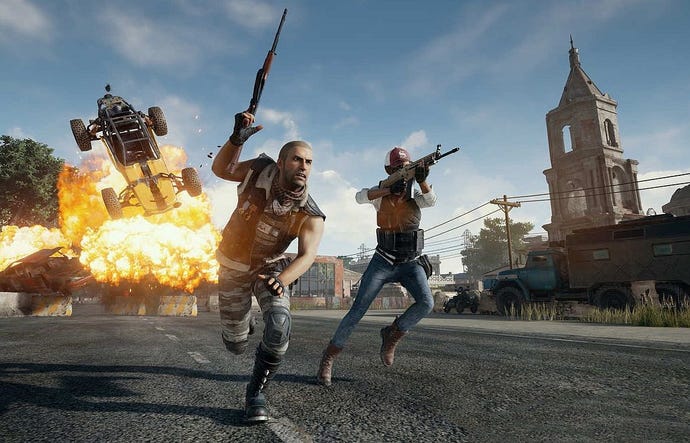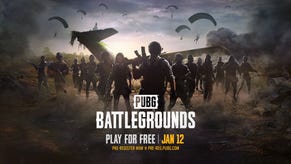Does the success of PUBG prove we don't need progression systems in games?
PlayerUnknown’s Battlegrounds may be quietly proving that we don’t need progression systems in games as much as we thought we did, but that's easy to think when the game barely has any competition.
PlayerUnknown’s Battlegrounds is an anomaly. Many design decisions that we know make games today successful, popular, or critically acclaimed are nowhere to be found in the game.
It’s a shooter with Arma-lite weapon mechanics often reserved for the hardcore crowd. Its pace varies wildly from round to round, where one game can bring constant action and another will have you sitting in a house somewhere for ten minutes waiting for a knock on your door. PUBG is a game that, by virtue of the unpredictable nature of its gameplay, is not easy to get better at it. It’s full of bugs, and doesn’t look especially great, nor does it have a unique art style.
All of these characteristics and many of their ilk exist in other games, but there's a reason why you don't see any of them in mainstream titles. What we're looking at here is an example that history and knowledge of the games market today tells us has no chance of being successful, let alone becoming the most played game on PC today (save for League of Legends).
Yet, somehow, against all conventional wisdom, PUBG has sold over 15 million copies in seven months on a single platform, and everyone is talking about it.
This poses an interesting dilemma. If a game defies what we’ve known for years to be the standard in feature sets and general design, what we think of as necessities in modern games, does this mean that we can live without most of them?
"PUBG has no business being successful, let alone becoming the most played game on PC today, save for League of Legends"
One such mystery is the game’s progression system, or lack thereof. You can play PUBG for hours on end and the only thing you have to show for it is a few meagre points of an in-game currency you use to buy some meaningless clothing items you won’t even see most of the time. You don’t gain XP by playing, and there’s no levelling system of any description. There aren’t any guaranteed rewards you can work for. Your reward for achieving the game’s ultimate goal of being the last player standing? A line of text that congratulates you on winning!
No fancy effects, elaborate animations or musical queues. The game’s UI doesn’t even celebrate this win in any way, you only get the famous "Winner winner, chicken dinner" and off you go. Winning a few rounds in a row doesn’t change that, you’re still going to get the same congratulatory sentence. What’s crucial here is that PUBG doesn’t make any effort to be more inviting or less frustrating to players who keep losing.
If you do terribly in a round of Call of Duty, Battlefield, or any of today’s big shooters - even lose a few in a row, the impact is marginal. Losing a round in PUBG is frustrating, you feel like someone else wrested the win from your own hands.
Modern shooters try their best to mitigate similar frustrations. No matter what you’re doing, you’re always making progress in these games. Every minute you spend playing will push you ever so slightly forward to the next level, the next unlock, the next challenge or milestone.
At the launch of every Call of Duty game, players dread having to get 25 kills with every weapon to unlock the first attachment for it. Depending on how manageable iron sights are for these weapons, it may feel like an eternity – but you soldier on through it all until you get your unlock. Then the real game begins.
Not in PUBG, where consecutive losses not only have no tangible progress to offer, they may aggravate you even more each time if every death is the result of a different cause. This lack of feedback can turn the experience really sour. Even the game’s best players will often have poor streaks without necessarily doing anything wrong. It’s part of the game, and you recognise that early on.
PUBG doesn’t try to keep players engaged with any incentives. Apart from your own enjoyment of its core loop and a desire to improve, there’s really not much there to keep you coming back once you reach the seen-it-all stage.
But when you step back to appreciate the bigger picture, you’ll realise that no other game today – that aims to be popular – can get away with not having a progression system. This excludes niche shooters, and those with classic leanings since these games’ makers know they're targeting a specific crowd.
I realise some of this may sound unfair. PUBG is still in Early Access, and a progression system would rightly not be a top priority for developer Bluehole, but it’s worth bringing up. Particularly how so many players would criticise other games for having unengaging progression systems yet make no such claims about PUBG.
The Battlefield community had this very discussion at the launch of Battlefield 1, which was a downgrade in the progression department compared to Battlefield 4. Some poor decisions by DICE, and the choice of the WW1 era greatly limited the available incentives for players beyond the honeymoon period. It made Battlefield 1 feel smaller than Battlefield 4 somehow.
Trying to imagine any of the games I like having zero progression made me realise that my opinion of them will change, despite the core remaining the same. It's a complicated relationship, no doubt, but one most games elect to keep anyway.
"In two or three years when we inevitably get an AAA-level Battle Royale shooter with everything you expect from modern games, what will happen to PUBG?"
So why is it that most players don’t have these problems with PUBG? You could argue that progression systems only exist on the periphery, padding out what’s already a solid core. But you can’t deny that their existence affects people’s enjoyment of games. Look at how popular the topic of Prestige is around Call of Duty launches.
Like it or not, it’s become a standard players expect, the same way a PC gamer expects a rich settings menu, even if they’re not going to mess around with it. Other good games have had it, why can't this one?
The answer is likely not as clean cut. Going back to the first point, it’s important to treat PUBG as an anomaly. When Blizzard released Hearthstone, World of Warcraft, and Overwatch, these games weren't the first or even second to do what they do. Blizzard nonetheless found mainstream success with each one using a core established by someone else.
What a coincidence, then, that all three also feature rich progression systems. It's been proven time and again that first doesn't always mean long lasting. In two or three years when we inevitably get an AAA-level Battle Royale shooter with everything you expect from modern games, what will happen to PUBG then?



















